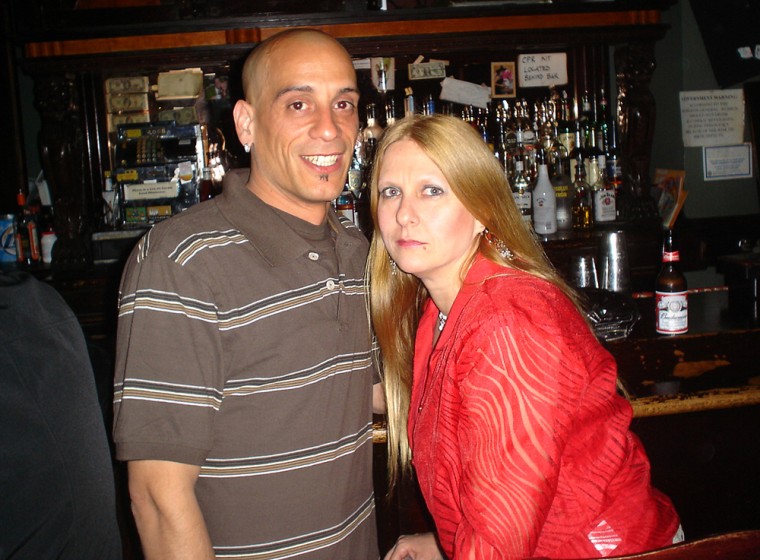Doreen Giuliano was obsessed with saving her son from a life behind bars after he was convicted of murder.
She gave herself an extreme makeover — blonde dye job, fake tan, sexy wardrobe, phony name — and began spying on jurors. She befriended one juror to root out any possible misdeeds at the trial, and for nearly eight months, they drank at bars, smoked marijuana and shared meals in her tiny Brooklyn hideaway.
The juror eventually opened up to her about his time as a juror, completely unaware that this seductive older woman was the same dutiful mother who sat through the entire trial just a few feet away from him.
The bizarre saga has become the basis for a defense motion filed this week demanding that the verdict be set aside, while exposing the desperate attempt that Giuliano made to win her son's freedom.
"What she did was extraordinarily commendable," said one of Giuliano's lawyers, Ezra Glaser. "It shows the love of a mother and the great lengths she'll go to to help her child."
Juror faces possibility of court
The juror, naturally, doesn't quite see it that way. Jason Allo faces the possibility of being hauled into court to explain conversations recorded by a seductive undercover mother wearing a wire.
"He didn't do anything wrong," said his attorney, Salvatore Strazzullo. "We're going to defend Mr. Allo's actions to the full extent of the law."
Among other things, the motion accuses the 33-year-old Allo of concealing that he had personal knowledge that Giuliano's son, John Giuca, ran with a rough crowd, and of defying orders to avoid news coverage once the highly publicized proceedings started. It argues that Allo "admitted the outside information he obtained about the case prejudiced him against Mr. Giuca."
A spokesman for the Brooklyn District attorney's office said only that the motion was being reviewed. But the defense is a longshot: Courts rarely overturn guilty verdicts by juries.
Guica was convicted of the 2003 murder of Mark Fisher, a 19-year-old college student from Andover, N.J., who had gone to an after-hours party Guica hosted in Brooklyn while his parents were out of town.
Prosecutors say Giuca, then a skinny 20-year-old, was a leader of a self-styled gang called the Ghetto Mafia. At trial, prosecutors said Fisher was targeted for showing "disrespect" by sitting on a table in Giuca's house.
Victim's body dumped on sidewalk
Giuca ordered another gang member "to go show that guy what's up," then gave the shooter a .22-caliber handgun, prosecutors said. At dawn, police responding to a report of gunshots found Fisher's body shot five times and dumped on a sidewalk.
It took more than a year for police to arrest the shooter. Giuca was taken into custody one month later after authorities secured witnesses who linked him to the crime.
A jury deliberated only two hours before convicting Giuca of second-degree murder in 2005. He and the gunman were sentenced to 25 years to life in prison by a judge who told them that because the killing was callous, "my sentence will be callous."
Lawyers for Giuliano and Allo refused requests to speak to their clients. But court papers — along with a piece in Vanity Fair magazine and an article in The New York Times based on interviews with Giuliano and Allo — detail a story of despair and deception.
Giuliano, 47, says she was driven by the belief her son was set up by authorities and vilified in the press.
"My main concern was that John got a fair trial," she said.
Said Allo: "I understand her motivation, but that's not right."
Mom had right to record conversations
Allo's lawyer declined to discuss Giuliano's tactics. But her lawyer said under state law, she "had a right to record those conversations."
"Ultimately, the only person who acted inappropriately was Mr. Allo," Glaser said.
By Giuliano's own account, her son's conviction nearly gave her a nervous breakdown. In 2006, she hatched a plan to begin spying on jurors to see if she could uncover any misconduct.
She eventually zeroed in on Allo, a construction worker with a shaved head living in the Bensonhurst section of Brooklyn. She tailed him for months, once even wearing a head scarf as a disguise.
While casing his apartment, "His cat sat in the window," she said. "So I knew I'd say I was a cat-lover when I met him."
In the fall of 2007, Giuliano reinvented herself. She slimmed down at the gym, rented an apartment in Allo's neighborhood and printed business cards with her assumed name: Dee Quinn, a recent West Coast transplant.
Orchestrated a chance meeting
Her husband initially told her she was crazy, but backed down. Soon she orchestrated a chance meeting with Allo on the street, pretending to be a lonely single woman from California and giving him her phone number.
Giuliano began inviting Allo over to her place to soften him up. He never recognized her from her days sitting through the trial.
"She was offering me wine, offering to smoke weed," he said.
There also was flirting. But both said it never went any further. Mainly, they talked. And her digital tape recorder rolled.
She says she struck gold in late 2007, while grilling her new friend about his jury duty.
"I'll tell you this but I would never tell anybody else," he said, according to transcripts prepared by the defense. "I actually had some type of information."
Allo went on to explain that he didn't know Giuca directly, but used to hang out in his clique and heard rumors about the Fisher slaying — something he failed to mention when questioned under oath during jury selection. Asked if he had been curious about newspaper accounts of the trial, he responded that he'd read them. He also bragged that he had been the first one during deliberations to vote for a conviction.
"I shouldn't have been in that jury," he said.
